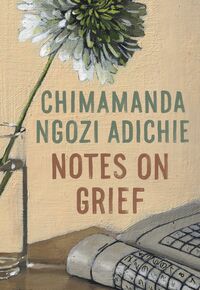Take a photo of a barcode or cover
dark
emotional
sad
medium-paced
emotional
funny
informative
reflective
sad
medium-paced
challenging
emotional
sad
medium-paced
challenging
emotional
reflective
sad
medium-paced
So incredibly sad and so beautifully written. Loved learning about her childhood in Nigeria and the picture of family she painted.
emotional
reflective
sad
slow-paced
"For the rest of my life, I will live with my hands outstretched for things that are no longer there."
4 stars ꣑ৎ
Notes on Grief feels personal—and it is. It’s a biography and a memoir, after all.
As someone who has experienced the death of a loved one (whether it’s a person or a pet—I’ve been through both), I truly relate to the author’s thoughts and feelings, especially when she was dealing with people. I will not forget Chapter 10, because it provided clarity about my own feelings. I felt seen and validated knowing that it’s not just me who felt that way, and someone—the author—helped me realize why those words don’t sit right.
Reading this book feels like a privilege, because it’s a story about her father and she chose to share it with the world. It’s like she turned her memory of him as a husband to her mother, as a father to them, and a grandfather to her child into a book. Although the title is a bit misleading (I expected more philosophical notes about grief like in the early chapters), I don’t want to criticize her for that if this is her way of coping. I actually found it sweet that she chose to write it this way. In between the pages, there’s her story about her father, and her personal experiences of grieving and dealing with loss.
Additionally, I appreciated how the author shared parts of their language, culture, and practices. I especially loved the words, phrases, and names her father used for them because they hold meaning. Even if there’s an equivalent in another language, it doesn’t hold the same weight and emotion when it’s not spoken in your mother tongue. I love how the author and her family value their language.
But most of all, I liked that the book didn’t offer a solution for grief because I personally believe there is none. she simply ended it with, “I cannot believe I am writing about my father in the past tense.” And honestly, that speaks volumes to me.
⋆˙⟡ “We don't know how we will grieve until we grieve.” ꒱ˎˊ˗
Notes on Grief feels personal—and it is. It’s a biography and a memoir, after all.
As someone who has experienced the death of a loved one (whether it’s a person or a pet—I’ve been through both), I truly relate to the author’s thoughts and feelings, especially when she was dealing with people. I will not forget Chapter 10, because it provided clarity about my own feelings. I felt seen and validated knowing that it’s not just me who felt that way, and someone—the author—helped me realize why those words don’t sit right.
Reading this book feels like a privilege, because it’s a story about her father and she chose to share it with the world. It’s like she turned her memory of him as a husband to her mother, as a father to them, and a grandfather to her child into a book. Although the title is a bit misleading (I expected more philosophical notes about grief like in the early chapters), I don’t want to criticize her for that if this is her way of coping. I actually found it sweet that she chose to write it this way. In between the pages, there’s her story about her father, and her personal experiences of grieving and dealing with loss.
Additionally, I appreciated how the author shared parts of their language, culture, and practices. I especially loved the words, phrases, and names her father used for them because they hold meaning. Even if there’s an equivalent in another language, it doesn’t hold the same weight and emotion when it’s not spoken in your mother tongue. I love how the author and her family value their language.
But most of all, I liked that the book didn’t offer a solution for grief because I personally believe there is none. she simply ended it with, “I cannot believe I am writing about my father in the past tense.” And honestly, that speaks volumes to me.
emotional
hopeful
inspiring
reflective
sad
medium-paced
emotional
sad
fast-paced
emotional
reflective
sad
fast-paced






